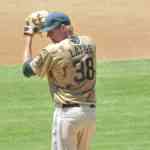This is the third year of the Tout Wars Head to Head League and the third new scoring system.
Year one we went with a roto scoring system for 22 head to head contests, and then a real roto scoring standings system for the remaining 36 contests. First place was 12-0, second was 11-1, and so on. It was an interesting idea that earned Jeff Zimmerman a win over Brent Hershey, despite Brent’s better direct H2H record, but it was cumbersome to track in season.
Year two we went with 22 head to head contests, using a variety of roto categories. Vlad Sedler edged out Andrea LaMont on the season. It was fine.
In both the first two years I finished third.
For Year three we’re moving to a traditional points scoring system. The idea has been pushed by Jake Ciely since day one, and the point that finally won the day was this one: More people play head to head points than any other game.
Of course, they don’t play head to head auction, and here is why that matters.
H2H points games are usually run with snake drafts. Teams pick in whatever order they’re assigned, with picks reversing each round. In a points league your goal is to amass the most points, and in a points draft the best player to take is the one you think is going to score the most points. Always.
In an auction, your goal is to buy the most points you can, but there are a variety of ways to get there. You can be creative in how you score your points. The creative approaches teams in the H2H league used this past weekend were two.
1) You could go stars and scrubs, buying expensive players and then filling in with cheap ones at the end. Every team but Clay Link did this, averaging less than three players who went in the teens (Link bought seven such).
2) You could go stars and scrubs, with all your stars pitchers, and spend only $59 on hitters. Only Justin Mason did this.
You can read about Justin’s team here. He basically cracked the code. He zigged in a way that gives him a pretty big advantage over every other team. Week after week. The reason is because in points leagues two-start pitchers generally earn a lot of points in their weeks, and stud pitchers, who go deep into games (like, say, Justin’s Kershaw and Scherzer) earn a lot of points every start. So in any given week pitchers are going to earn a lot of points, giving Justin’s team a win in pitching.
As long as he scores enough hitting points so that he loses hitting by less than he wins pitching by, he’ll go home each week a 6-2 winner. (Each contest gives two wins to the hitting winner, two wins to the pitching winner, and four wins to the overall winner, and corresponding losses.)
Because this is a 12-team league, there are plenty of replacement players out there. Lots of decent hitters on the waiver wire. The rest of us have a lot of work to do.
For my part, I didn’t come up with a very clever way to take advantage of the rules. Having never played in a points league before, I took my projections, converted them to points, and tried to buy the highest scorers. I figured the most expensive players would be a little overpriced, because they didn’t really score that many more points than others, and I went for guys on the next tier. I like my team, who doesn’t like a 12-team league team, but have no idea how to measure it against the others, all of which have a similar mix of costly hitters, costly pitchers and cheap everything else.
I think we’re going to have to play this one out, and hope that Justin doesn’t run away with it early.
Team Rotoman
C: Sal Perez, Yasmani Grandal
MI: Brian Dozier, Elvis Andrus, Whit Merrifield
CI: Paul Goldschmidt, Josh Donaldson, Eric Hosmer
OF: AJ Pollock, Billy Hamilton, Domingo Santana, Ian Happ, Manny Margot
UT: Yuli Gurriel
SP: Stephen Strasburg, Jake Arrieta, James Paxton, Taijuan Walker, Rich Hill, Kenta Maeda
RP: Jeurys Familia, Arodys Vizcaino, Alex Colome
RES: Willie Calhoun, David Robertson, AJ Minter, Amed Rosario, Carlos Rodon, Zach Britton
This is a team that’s probably light in power and innings, that will need a breakout season for Taijuan Walker to push it over the top.


